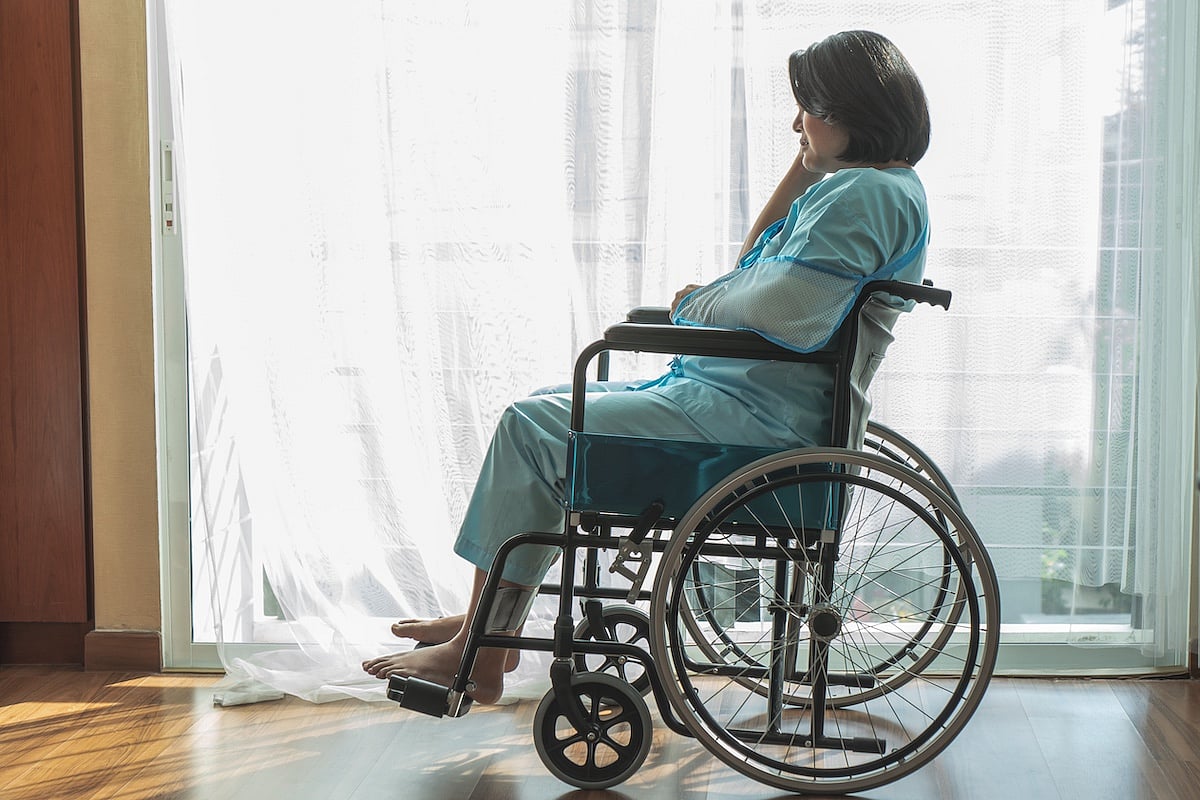Get Healthy!
Staying informed is also a great way to stay healthy. Keep up-to-date with all the latest health news here.
15 Dec
Uterine Fibroids May Signal Heart Trouble, Major Study Finds
In a new study, women with uterine fibroids had an 81% higher risk of suffering a heart attack, stroke or other major cardiovascular event within 10 years.
12 Dec
New Study: Acupuncture Shows Real Promise for Cancer ‘Brain Fog’
A new study finds acupuncture may help breast cancer survivors struggling with attention, memory and other cognitive problems.
11 Dec
Everyday Moves That Spike — or Reduce — Low Back Pain
Researchers look at how 10 common activities affect low back pain over the short and long term.
Most Americans Are Happy With Health Insurance, Poll Finds
Most folks in the United States are happy with their health insurance, according to a new national poll, but many still struggle with denied claims, delays and rising costs.
The poll, conducted by NBC News Decision Desk and SurveyMonkey, found 82% of U.S. adults satisfied with their health insurance overall. About 1 in 3 said they...
- I. Edwards HealthDay Reporter
- |
- December 16, 2025
- |
- Full Page
Childhood Behavioral Problems Are Straining Family Finances, Experts Say
Kids’ behavioral problems account for a growing chunk of their health care costs, a new study says.
Mental health, substance use and other behavioral health care made up about 40% of all health expenditures for U.S. children in 2022, nearly twice as much as in 2011, according to findings published Dec. 15 in JAMA Pediatrics....
- Dennis Thompson HealthDay Reporter
- |
- December 16, 2025
- |
- Full Page
Love Can Help The Heart Heal, Evidence Says
Hearts are often associated with love, especially around Valentine’s Day.
That’s more relevant than you might think, a new evidence review says.
The support of a beloved partner can dramatically improve recovery for people who’ve had a heart attack, heart failure or other heart-related emergency, researchers reporte...
- Dennis Thompson HealthDay Reporter
- |
- December 16, 2025
- |
- Full Page
COVID Vaccine During Pregnancy Reduces Risk Of Preterm Birth
Pregnant women who get the COVID-19 vaccine are less likely to have a preterm birth, a new study says.
Vaccination was also strongly associated with lower risk of hospitalization or intensive care treatment among expecting mothers, researchers reported Dec. 15 in the Journal of the American Medical Association.
“Our fi...
- Dennis Thompson HealthDay Reporter
- |
- December 16, 2025
- |
- Full Page
Risk-Based Breast Cancer Screening Outperforms Annual Mammograms, Clinical Trial Finds
Tailoring breast cancer screening to a woman’s individual cancer risk might work better than annual mammograms, a new study says.
Women had breast cancers caught at an earlier, more treatable stage when assigned to risk-based screening, compared to those who got annual mammograms regardless of personal risk, researchers reported Dec....
- Dennis Thompson HealthDay Reporter
- |
- December 16, 2025
- |
- Full Page
Dad, Grandpa Might Be Taking A Dangerous Risk While Stoned, Survey Finds
Efforts to stop weed-impaired driving are ignoring the traffic risk posed by a stoned dad or grandpa, a new study says.
About 1 out of 5 (20%) people 50 and older who use weed reported they’d driven while high at least once during the past year, researchers report in the January 2026 issue of the journal Drug and Alcohol Dependen...
- Dennis Thompson HealthDay Reporter
- |
- December 16, 2025
- |
- Full Page
Large Review Finds Limited Proof Behind Many Medical Cannabis Uses
Medical marijuana is often seen as a safer, natural way to ease pain, anxiety or sleep issues. But a large new review suggests that for many of these uses, the science simply isn’t there.
It adds that a significant share of folks, roughly 30%, using cannabis for medical reasons may actually be at risk for addiction.
The review,...
- I. Edwards HealthDay Reporter
- |
- December 15, 2025
- |
- Full Page
COVID Vaccines Cut ER Visits for Children, CDC Reports
COVID-19 vaccines given to children last fall helped keep many out of emergency rooms (ER) and urgent care, new data shows.
The U.S. Centers for Disease Control and Prevention (CDC) reported that COVID vaccines reduced the risk of ER visits by 76% in kids under age 4 and by 56% in kids ages 5 to 17 during the first six months after vaccina...
- I. Edwards HealthDay Reporter
- |
- December 15, 2025
- |
- Full Page
FDA Approves Two New Antibiotics to Treat Drug-Resistant Gonorrhea
Doctors now have new tools to fight gonorrhea, a common sexually transmitted infection that has grown harder to treat over time.
The U.S. Food and Drug Administration (FDA) has approved two new antibiotics: Zoliflodacin and gepotidacin.
This is the first new major treatment for gonorrhea in decades.
On Friday, the FDA cleared z...
- I. Edwards HealthDay Reporter
- |
- December 15, 2025
- |
- Full Page
FDA Weighs Strongest Black Box Warning for COVID Vaccines
The U.S. Food and Drug Administration (FDA) is considering adding the strongest safety warning available to COVID-19 vaccines.
The move has alarmed many outside health experts, who say there is no scientific basis for the warning.
People familiar with the plan told CNN the FDA is weighing whether to place a black box warning...
- I. Edwards HealthDay Reporter
- |
- December 15, 2025
- |
- Full Page
Too Much Drinking Contributes To Cancer Risk, Study Says
A new evidence review offers some sobering info for folks preparing to raise more than a couple celebratory glasses during Christmas or New Year’s.
Alcohol significantly increases a person’s risk of developing a wide range of cancers, and that risk rises further as more is imbibed, researchers reported in the journal Cancer...
- Dennis Thompson HealthDay Reporter
- |
- December 15, 2025
- |
- Full Page
Home-Delivered Food Boxes Improve Diabetes Control, Experts Say
Folks with diabetes might fare better if health care professionals pick out and deliver their groceries, a new study says.
Folks with diabetes who received home deliveries of diabetes-appropriate grocery boxes for three months had better blood sugar control by the end of the experiment, researchers reported in the December issue of the
- Dennis Thompson HealthDay Reporter
- |
- December 15, 2025
- |
- Full Page
Doing Nothing Appears Best Approach To Common Heart Defect Among Preemies
Doing nothing at all to manage a common fetal heart defect might improve the survival odds of babies born prematurely, compared to treatment with drugs, a new clinical trial suggests.
A “wait and see” approach to patent ductus arteriosus (PDA) doubled a preemie’s chances of survival, compared with using drugs to treat the...
- Dennis Thompson HealthDay Reporter
- |
- December 15, 2025
- |
- Full Page
Some Can Slowly Taper Off Antidepressants Without Risk Of Relapse, Review Concludes
It’s safe to slowly taper some people off antidepressants after their depression fades, rather than continuing the drugs indefinitely, a new evidence review says.
People who slowly tapered off antidepressants while receiving psychological counseling had a similar risk of relapse to those who kept taking the drugs with or without ther...
- Dennis Thompson HealthDay Reporter
- |
- December 15, 2025
- |
- Full Page
Mothers' Milk Might Be Key To Avoiding Childhood Food Allergies
Farm kids tend to have far fewer allergies than urban children, and a new study offers one possible explanation: The milk provided by breastfeeding moms.
Children who grow up in farming communities have immune systems that mature faster, with higher levels of protective antibodies during their first year of life, researchers reported Dec. ...
- Dennis Thompson HealthDay Reporter
- |
- December 15, 2025
- |
- Full Page
Most Receive Shock Therapy Without Psychological Counseling, Survey Says
Most people receiving shock therapy for mental health problems aren’t receiving any sort of psychological counseling before having their brains zapped, a new study says.
Only a third of patients said they’d been asked about recent stressful events or childhood traumas like abuse or neglect before being given electroconvul...
- Dennis Thompson HealthDay Reporter
- |
- December 15, 2025
- |
- Full Page
How to Head Off Tendon Trouble
Injure a tendon and you might not notice right away, but beware: These injuries often fail to heal properly, putting everyday activities at risk.
"No matter how strong your muscle is, you’re not going to be able to have the functionality and the stability you need if a tendon is impaired," Nelly Andarawis-Puri, a bioengineering...
- Carole Tanzer Miller HealthDay Reporter
- |
- December 14, 2025
- |
- Full Page
Ignore the Influencers: Simple Showers Are Still Best
Listen to the influencers, skin-care specialists say, and your daily shower could do more harm than good.
"Your skin is a barrier," said Dr. Nicole Negbenebor, a dermatologic surgeon at University of Iowa Health Care, told The Associated Press. "So you want to treat it right, and then sometimes there can be too much of a good thin...
- Carole Tanzer Miller HealthDay Reporter
- |
- December 13, 2025
- |
- Full Page
New Sunscreen Ingredient Could Soon Be Allowed in the U.S.
Americans may soon have access to a new sunscreen ingredient already used around the world.
The U.S. Food and Drug Administration (FDA) announced Dec. 11 that it is reviewing a proposal to allow bemotrizinol in sunscreens sold in the United States.
The ingredient is already approved and widely used in Europe, Australia and part...
- I. Edwards HealthDay Reporter
- |
- December 12, 2025
- |
- Full Page
Many Older Americans Don’t See Themselves as Disabled, Survey Finds
Americans may be getting older and need help doing things that were once routine, but a new survey finds only a fraction of seniors see themselves as having a disability.
"It’s a familiar story," Megan Morris, director of the Disability Equity Collaborative at New York University, told KFF Health News. "Many people still fee...
- Carole Tanzer Miller HealthDay Reporter
- |
- December 12, 2025
- |
- Full Page


.jpg?w=1920&h=1080&mode=crop&crop=focalpoint)




















